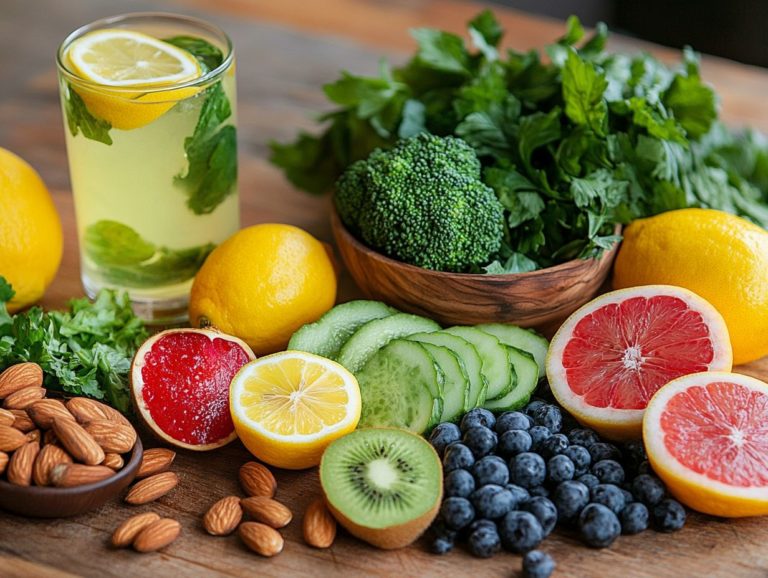Top 7 Holistic Nutrition Myths Debunked
In today s world, navigating nutrition advice can feel like wading through a sea of confusion and contradictions. Many widely accepted beliefs about diet and health are, in fact, myths that can lead you off course.
This article will debunk seven persistent myths surrounding holistic nutrition. We ll address misconceptions about fats and carbs, as well as the effectiveness of detox diets and supplements.
Get ready to unveil the truth about nutrition and transform your health! You’ll explore the principles of holistic nutrition and discover how it can tackle specific health issues, empowering you to make informed choices for a healthier lifestyle.
Contents
- Key Takeaways:
- 1. Myth 1: All Fats Are Bad for You
- 2. Myth 2: Carbs Are the Enemy
- 3. Myth 3: You Need to Eat Multiple Small Meals Throughout the Day
- 4. Myth 4: Detox Diets Are Necessary for Health
- 5. Myth 5: Organic Foods Are Always Healthier
- 6. Myth 6: Supplements Can Replace a Healthy Diet
- 7. Myth 7: Eating Late at Night Causes Weight Gain
- What Is Holistic Nutrition and How Does It Differ from Traditional Nutrition?
- Frequently Asked Questions
- What Are the Top 7 Holistic Nutrition Myths That Have Been Debunked?
- Is Eating Fat Really Bad for You?
- Are All Carbs Unhealthy?
- Is All Sugar Harmful to Your Health?
- Are Gluten-Free Diets Always Healthier?
- Do Organic Foods Always Trump Non-Organic Foods?
- Do Vegetarian/Vegan Diets Lack Essential Nutrients?
- Are Detox Diets Necessary for Cleansing?
Key Takeaways:

- Did you know? Not all fats are bad for you!
- Carbs are not the enemy! Whole grains and fruits are essential for your energy.
- Listen to your body! You do not need to eat multiple small meals throughout the day.
1. Myth 1: All Fats Are Bad for You
The belief that all fats are bad for your health is a widespread myth. This misconception clouds the understanding of the role dietary fats play in a well-rounded nutrition plan.
In truth, healthy fats like those in avocados and omega-3-rich foods are vital for energy and maintaining heart health. They deliver essential nutrients for various bodily functions.
It s essential to distinguish between saturated and unsaturated fats. Saturated fats, found in animal products and some plant oils, can raise cholesterol levels. Excessive intake may contribute to heart disease.
On the other hand, unsaturated fats, particularly monounsaturated and polyunsaturated types, help reduce the risk of heart problems. Nutritionists recommend adding foods like nuts, seeds, and fatty fish to your diet. These healthy fats can enhance heart health by lowering inflammation and cholesterol levels.
Numerous scientific studies reveal that diets rich in unsaturated fats correlate with a decreased incidence of heart disease. This underscores the importance of understanding the benefits of fat, moving beyond outdated misconceptions.
2. Myth 2: Carbs Are the Enemy
The idea that carbohydrates are inherently harmful is a misconception. In reality, they are essential to a balanced diet, providing the energy you need.
When you choose carbohydrates from whole grains, fruits, and vegetables, you’re not just fueling your body you re nurturing your overall health and aiding in weight management.
By prioritizing complex carbohydrates over simple sugars, you ll experience a steadier release of energy. This helps you avoid those dreaded crashes and enhances your focus throughout the day.
Complex carbs are rich in fiber, supporting digestive health. They can aid in maintaining a healthy weight by keeping you feeling full.
Foods like oats, legumes, and leafy greens deliver essential nutrients and promote a balanced community of bacteria in your gut, ultimately leading to better health outcomes.
Therefore, grasping the distinct roles of various carbohydrate sources is crucial for making informed dietary decisions.
3. Myth 3: You Need to Eat Multiple Small Meals Throughout the Day
The belief that you must consume multiple small meals throughout the day for optimal health doesn t hold up against recent scientific scrutiny. Research indicates that meal timing and food quality are more crucial for achieving a balanced diet.
This idea is challenged by studies suggesting that fewer meals with higher nutritional value can lead to better outcomes for some individuals. Intermittent fasting, for example, has gained popularity, boasting potential benefits like improved metabolic health and better cognitive function.
Advocates of frequent meals argue that this approach can help stabilize blood sugar levels and maintain energy throughout the day. Ultimately, it s vital to recognize that your dietary needs can vary significantly based on factors like your lifestyle, activity level, and personal health ambitions.
By tuning into your body and prioritizing the quality of nutrients you consume, you may find it s often more advantageous than strictly following a specific meal frequency regimen.
4. Myth 4: Detox Diets Are Necessary for Health
The notion that detox diets are essential for your health is a widespread misconception. In reality, your body is naturally designed to detoxify itself. A balanced diet full of fruits, vegetables, and whole foods effectively supports this process no extreme cleansing protocols required.
This remarkable ability hinges on your liver, kidneys, and lungs, which tirelessly filter out toxins and waste. By consuming a diverse array of nutrients from wholesome foods, you not only fuel these vital organs but also assist in their continuous regeneration.
While the allure of quick results through detox diets may be tempting, it s important to acknowledge the potential risks associated with these extreme measures, such as nutrient deficiencies and metabolic disruptions.
You can enhance your well-being by considering healthier alternatives like regular exercise, staying hydrated, and practicing mindful eating habits. Embracing gradual lifestyle adjustments often proves to be more beneficial than drastic detoxification efforts. Make simple changes today for a healthier tomorrow!
5. Myth 5: Organic Foods Are Always Healthier

While organic foods are often touted as the ultimate health champions, that assumption can be a bit misleading. The nutritional value of food varies widely, and many conventional options are just as nutritious, offering essential vitamins and minerals without the potential additives lurking in some processed organic products.
The real key is understanding the broader context of your dietary choices. It’s all about the quality and source of the ingredients. Many conventional foods are full of nutrients that support overall health and wellness, whereas some organic selections might still pack in preservatives or be overly processed.
Prioritizing whole foods those that are minimally processed and closer to their natural state over those that have undergone significant refinement is a smart move.
By zeroing in on nutrition rather than getting swept up in marketing claims, you can make more informed choices that genuinely enhance your well-being.
6. Myth 6: Supplements Can Replace a Healthy Diet
The notion that dietary supplements can substitute a healthy diet is a dangerous myth that fails to recognize the holistic benefits of whole foods. A well-rounded diet, abundant in nutrients, vitamins, and minerals, offers intricate interactions that isolated supplements simply cannot replicate.
This misunderstanding undermines the value of natural food sources and poses health risks for those who lean too heavily on pills to meet their nutritional needs. A balanced diet is essential for overall well-being, equipping your body with the tools necessary to flourish, enhancing everything from cognitive function to immune response.
Relying too much on supplements can create imbalances, lead to potential toxicity, and encourage the neglect of essential dietary habits. Make whole foods your priority to foster a sustainable lifestyle and cultivate dietary practices that nourish both body and mind.
7. Myth 7: Eating Late at Night Causes Weight Gain
The idea that eating late at night inevitably causes weight gain is a prevalent myth. In reality, weight management hinges more on your overall caloric intake and the quality of the food you consume rather than when you eat.
Research indicates that individual metabolic rates and lifestyle factors significantly influence weight management. This means that responses to meal timing can vary from person to person. For example, a study published in the journal Obesity highlighted that individuals who consumed their main meals earlier in the day often reported more successful weight loss. This underscores the importance of syncing meal timing with the natural cycles of your body clock.
However, you might find that a schedule tailored to your work or social life works best for you, demonstrating that flexibility is key. By customizing your eating habits to align with your personal needs and preferences, you can make healthier choices without necessarily facing unwanted weight gain.
This approach allows for a diverse and balanced perspective on nutrition and wellness.
What Is Holistic Nutrition and How Does It Differ from Traditional Nutrition?
Holistic nutrition offers you an integrative approach to dietary practices that highlights the deep connection of mind, body, and spirit in achieving optimal health. This perspective embraces a broader view that considers your lifestyle, emotional well-being, and overall wellness, unlike traditional nutrition, which often zooms in solely on the nutrients within food.
In this paradigm, food is not merely fuel; it serves as a means to nourish your entire self. Practitioners of holistic nutrition recognize that your emotions and mental states can greatly influence your dietary choices and habits. They advocate for a harmonious balance of physical nutrients alongside mental and emotional support, promoting practices such as mindful eating and effective stress management techniques.
By cultivating a deeper connection with your dietary choices, holistic nutrition gives you the power to nurture both your physical health and emotional resilience. This approach ultimately paves the way for sustained overall wellness, encouraging you to embrace a lifestyle that truly nourishes every aspect of your being.
What Are the Key Principles of Holistic Nutrition?
- Embrace whole foods.
- Achieve a balance of macronutrients nutrients your body needs in large amounts, like proteins, fats, and carbohydrates.
- Practice mindful eating.
- Consider your individual dietary needs.
These principles aim to enhance your overall wellness while incorporating a diverse array of essential nutrients. For example, when you choose organic fruits and vegetables, you re not just sidestepping harmful pesticides; you re also enriching your diet with the vitamins and minerals your body craves for optimal function.
Balancing macronutrients allows you to tailor your dietary intake to match your unique energy requirements and metabolic rate, ultimately bolstering your fitness goals and energy levels.
Mindful eating encourages you to savor the flavors and textures of your meals, promoting better digestion and satisfaction, which can help you avoid overeating.
By personalizing your nutrition to account for specific health conditions, allergies, and lifestyle preferences, you ensure that your dietary choices harmonize with what your body truly needs, paving the way for a sustainable journey toward improved health and well-being.
How Can Holistic Nutrition Help with Specific Health Concerns?

Holistic nutrition is a game-changer for tackling health concerns! It can help with issues like hypertension, digestive discomfort, and low energy levels. By focusing on tailored dietary choices, you can incorporate a variety of nutrients, vitamins, and minerals that support your body s functions and enhance overall wellness.
If you’re dealing with hypertension, consider adding potassium-rich foods like bananas and sweet potatoes to your meals; they can help keep your blood pressure in check.
If digestive issues are a concern, fiber-dense fruits like apples or whole grains might provide the relief you seek by promoting gut health.
To elevate your energy levels, include complex carbohydrates like quinoa and legumes, complemented by healthy fats from avocados or nuts for sustained energy throughout the day.
By diversifying your diet in these thoughtful ways, you can establish a more balanced nutritional profile that directly addresses your unique health needs.
What Are Some Common Misconceptions About Holistic Nutrition?
Despite its rising popularity, several misconceptions about holistic nutrition still linger. Some may claim it s just a passing trend or that it demands strict dieting.
In truth, it champions a balanced approach to eating that prioritizes your health and wellness without imposing unnecessary restrictions. This perspective emphasizes the importance of nourishing your body with wholesome, minimally processed foods while also considering the emotional and mental dimensions of eating.
Unlike fad diets that often result in temporary weight loss and can foster unhealthy behaviors or an obsessive relationship with food, holistic nutrition encourages you to cultivate sustainable eating habits that truly support your overall well-being.
This approach acknowledges that everyone is unique, making it essential to tailor your dietary choices to align with your lifestyle, preferences, and health needs. By addressing both physical health and emotional satisfaction, holistic nutrition nurtures a genuine and enjoyable relationship with food, allowing you to savor every bite.
How Can One Incorporate Holistic Nutrition into Daily Life?
Incorporating holistic nutrition into your daily life can be achieved through simple yet effective practices. Start by practicing awareness of what you eat, favoring whole foods over processed options, and focusing on a balanced diet that includes a variety of nutrients tailored to your unique needs and preferences.
To begin this transformative journey, set aside time each day to prepare meals from scratch. This will help you connect more deeply with your food. Engaging in mindfulness practices, such as breathing exercises before meals, can enhance your awareness of hunger cues and the delightful flavors of your dishes.
Choosing seasonal and local produce supports local farmers and ensures you enjoy fresher ingredients brimming with nutrients. This commitment to quality food nourishes both your body and mind, enhancing your overall health and well-being in your daily routines.
What Are Some Tips for Finding a Reliable Holistic Nutritionist?
Finding a reliable holistic nutritionist requires careful evaluation of their qualifications and an understanding of their approach to nutrition. Make sure their philosophy aligns with your personal health goals and needs for a balanced diet.
Check the nutritionist’s credentials; look for certifications from recognized organizations and relevant academic backgrounds. Experience is also important practitioners who have worked with diverse clients often bring valuable insights that can enhance your journey.
Make sure your nutritionist shares your food values, whether you prefer plant-based options, gluten-free choices, or have other specific requirements.
During your consultations, don’t hesitate to ask questions like:
- What is your philosophy regarding food sensitivities?
- How do you tailor your plans for individual lifestyles?
These inquiries will help you assess their expertise and confirm that they understand your unique perspective on health.
Frequently Asked Questions
What Are the Top 7 Holistic Nutrition Myths That Have Been Debunked?

The top 7 holistic nutrition myths that have been debunked are:
- Eating fat makes you fat.
- All carbs are bad for you.
- All sugar is bad for you.
- Gluten-free diets are healthier.
- Organic foods are always better.
- Vegetarian/vegan diets lack essential nutrients.
- Detox diets are necessary for cleansing.
Is Eating Fat Really Bad for You?
No, not all fats are bad for you. In fact, your body needs healthy fats for proper functioning. Avoiding all fats can lead to deficiencies in essential fatty acids.
Are All Carbs Unhealthy?
No, not all carbs are unhealthy. Complex carbohydrates found in whole grains, fruits, and vegetables are important sources of energy and essential nutrients.
Is All Sugar Harmful to Your Health?
No, not all sugar is harmful. Natural sugars found in fruits and honey can provide important nutrients and energy. It’s the added sugars in processed foods that should be limited.
Are Gluten-Free Diets Always Healthier?
No, gluten-free diets are not necessarily healthier unless you have a diagnosed gluten intolerance or celiac disease. In fact, gluten-free products can often have unhealthy additives and lack essential nutrients.
Do Organic Foods Always Trump Non-Organic Foods?
No, organic foods are not always better. While they may have fewer pesticides, they are not necessarily more nutritious. Non-organic foods can also be just as nutritious and often more affordable.
Do Vegetarian/Vegan Diets Lack Essential Nutrients?
No, vegetarian and vegan diets can provide all essential nutrients if well-planned and varied. Ensure adequate intake of nutrients like iron, vitamin B12, and omega-3 fatty acids.
Are Detox Diets Necessary for Cleansing?
No, your body has its own natural detoxification system and does not require a specific diet for cleansing. Following a balanced and healthy diet is the best way to support your body’s natural detox process.
Start your journey to better health today!






